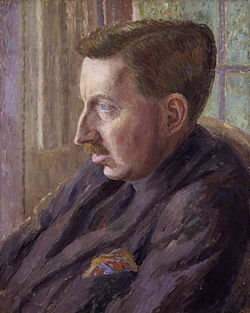E.M. Forster Quote
I only know what it is that's wrong with him; not why it is.And what is it? asked Lucy fearfully, expecting some harrowing tale.The old trouble; things won't fit.What things?The things of the universe. It's quite true. They don't.Oh Mr. Emerson, whatever do you mean?In his ordinary voice, so that she scarcely realized he was quoting poetry, he said: 'From far, from eve and morning, And yon twelve-winded sky, The stuff of life to knit me Blew hither: here am I.George and I both know this, but why does it distress him? We know that we come from the winds, and that we shall return to them; that all of life is perhaps a knot, a tangle, a blemish in the eternal smoothness. But why should this make us unhappy? Let us rather love one another, and work and rejoice. I don't believe in this world of sorrow.
I only know what it is that's wrong with him; not why it is.And what is it? asked Lucy fearfully, expecting some harrowing tale.The old trouble; things won't fit.What things?The things of the universe. It's quite true. They don't.Oh Mr. Emerson, whatever do you mean?In his ordinary voice, so that she scarcely realized he was quoting poetry, he said: 'From far, from eve and morning, And yon twelve-winded sky, The stuff of life to knit me Blew hither: here am I.George and I both know this, but why does it distress him? We know that we come from the winds, and that we shall return to them; that all of life is perhaps a knot, a tangle, a blemish in the eternal smoothness. But why should this make us unhappy? Let us rather love one another, and work and rejoice. I don't believe in this world of sorrow.
Related Quotes
About E.M. Forster
Considered one of the most successful of the Edwardian era English novelists, he was nominated for the Nobel Prize in Literature in 22 separate years. He declined a knighthood in 1949, likely due at least in part to having witnessed the impacts of colonization on India, though he accepted the Order of Merit upon his 90th birthday. Forster was made a Member of the Order of the Companions of Honour in 1953, and in 1961 he was one of the first five authors named as a Companion of Literature by the Royal Society of Literature.
After attending Tonbridge School, Forster studied history and classics at King's College, Cambridge, where he met fellow future writers such as Lytton Strachey and Leonard Woolf. He then travelled throughout Europe before publishing his first novel, Where Angels Fear to Tread, in 1905. The last of his novels to be published, Maurice, is a tale of homosexual love in early 20th-century England. While completed in 1914, the novel was not published until 1971, the year after his death.
Many of his novels were posthumously adapted for cinema, including Merchant Ivory Productions of A Room with a View (1985), Maurice (1987) and Howards End (1992), critically acclaimed period dramas which featured lavish sets and esteemed British actors, including Helena Bonham Carter, Daniel Day-Lewis, Hugh Grant, Anthony Hopkins and Emma Thompson. Director David Lean filmed another well-received adaptation, A Passage to India, in 1984.
